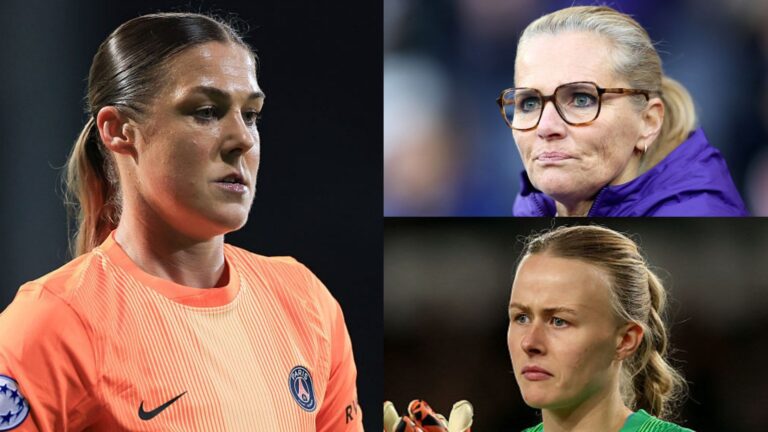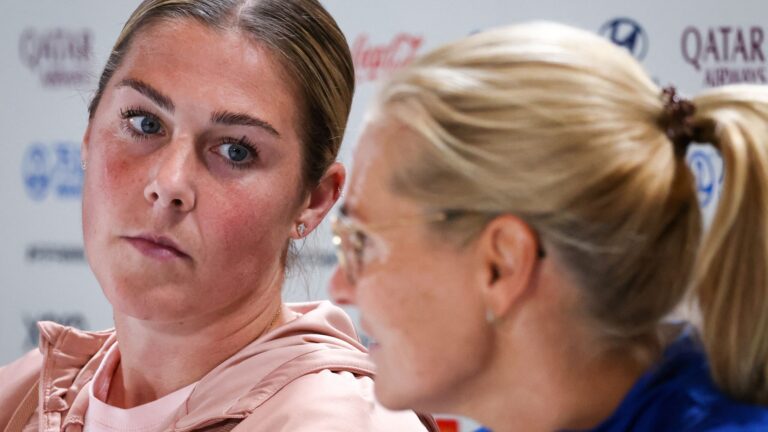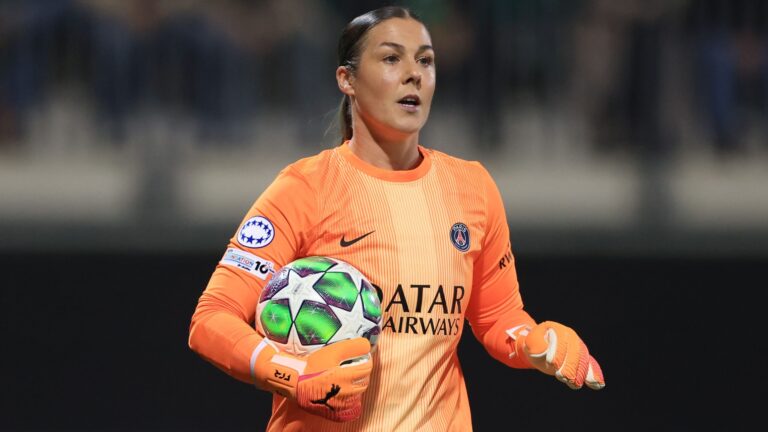- NWSL allegedly warns of penalties against KC Current
- Last week’s game experienced delays lasting three hours
- NWSL Players Association counters the league’s stance



Stormy Skies and Soccer Showdown: NWSL Debates Fines for KC Current Over Weather Woes
In the growing world of women’s professional soccer, the NWSL and KC Current clash over a major weather delay that prioritized player health against tight broadcast timelines. This event sheds light on persistent difficulties in balancing harsh environmental factors with game operations, prompting deeper scrutiny of league regulations and the protection of athletes’ well-being.
NWSL’s Stance on the Extended Weather Hiccup
Emerging accounts indicate that NWSL Commissioner Jessica Berman is weighing disciplinary actions toward the Kansas City Current following a delay of more than three hours, triggered by intense heat during their latest contest. This dispute arises from attempts to emphasize well-being in the face of sweltering conditions, showcasing the intricate trade-off between pushing forward with events and exercising prudence in elite athletics.
Game Overview and Heat-Related Obstacles
The Kansas City Current hosted the Orlando Pride at their home venue, with the match originally planned for early afternoon but rescheduled to later in the day. Extreme heat surpassing 90 degrees on the field activated NWSL protocols, requiring evaluations to check if playing conditions were viable. A temperature measurement taken right before the initial start time sat just below the danger limit, fueling arguments about the wisdom of continuing as scheduled.
NWSL Policies and How Choices Were Made
According to NWSL standards, the fourth official performed a temperature assessment 15 minutes prior to kickoff, noting figures around 93 degrees. These guidelines grant the league final say in any delays, stressing the importance of evidence-based decisions over other factors. Both sides communicated concerns to league authorities regarding the weather, suggesting a postponed start, yet they were directed to stick to the original plan while implementing heat mitigation measures.
Effects on Media Coverage and Audience Engagement
This event was one of 11 key regular-season matches broadcast on CBS this season, though the prolonged interruption moved it to a digital format. The league’s announcement to news sources reiterated their focus on holding games only when secure, depending on current weather data instead of forecasts to inform actions as per their established weather procedures.
Health documentation from the University of Kansas Health System shows that 18 people received care for heat-related problems at the site, including one case needing hospital care-a clear indicator of the serious dangers present. Viewer input, like that from KC Blue Crew member Danielle Russell, highlighted flaws in information sharing during the holdups, arguing that protecting participants should trump schedule issues, particularly for prominent matches prone to weather risks.
Players’ Group’s Prior Alerts
The NWSL Players Association raised red flags about scheduling issues back in January, when the season calendar was set. Executive director Meghann Burke pointed out that their contract provides for feedback on timings, and they particularly warned about the perils of an early afternoon game in Kansas City’s hot summer weather.
Concerns About How the Delay Was Managed
Burke took issue with the multiple warm-up periods and step-by-step extensions, implying they showed either overly hopeful assumptions about dropping temperatures or efforts to justify playing despite threats. She commended the medical team’s proficiency, crediting it to recent enhancements in health services and tech via labor deals, and argued that these judgments belong to skilled experts rather than managerial demands.
Wider Consequences for Athlete Protection in the NWSL
Latest data indicates a 25% surge in weather-induced disruptions this season versus the previous one, with comparable events under review, including the choice to proceed after an Angel City player’s collapse earlier on. Burke stressed that pressures from things like nationwide broadcasts may sway these decisions, possibly overlooking athlete health even with robust on-site medical aid.
Current Season Progressions
As the league moves into Matchday 17, the Orlando Pride has endured a 1-0 defeat to Angel City, while the KC Current gears up for a face-off with the Portland Thorns. These occurrences are intensifying conversations about updating NWSL strategies to more effectively handle weather threats and affirm that safety leads in women’s professional soccer.
Examining the KC Current’s Weather Disruption Saga
Within the vibrant realm of women’s soccer, the NWSL Commissioner’s potential fine for KC Current has ignited heated debates across fan communities, teams, and administrators. This issue originates from a recent fixture with the Kansas City Current that faced substantial weather interruptions, underscoring the importance of grasping these scenarios for NWSL enthusiasts and sports administrators alike.
The episode unfolded during a critical match, where abrupt storms compelled officials to stop proceedings, sparking inquiries into compliance with safety protocols. Renowned for its energetic style and increasing supporters, KC Current became the focal point of criticism as reports suggested lapses in following league weather delay rules, leading to talks of penalties that reflect NWSL’s dedication to upholding standards in women’s soccer.
Core Aspects of the Dispute
Exploring further, the weather delay matter includes claims that KC Current’s leadership failed to quickly coordinate with NWSL staff or apply necessary safety steps. As per various accounts, the interruption surpassed league limits, possibly jeopardizing the safety of players and attendees. This has placed the NWSL Commissioner in a tough spot, where applying fines might establish benchmarks for upcoming cases.
- Sequence of Occurrences: Play was suspended because of lightning and torrential rain, with interruptions extending over an hour. Reports suggest KC Current’s team might have downplayed the storm’s intensity, causing lags in clearing the area.
- Regulations in Question: NWSL mandates rigorous procedures for weather delays, such as instant game stops and effective communication systems. Breaches could lead to penalties in the thousands, highlighting the league’s emphasis on safeguarding participants in women’s soccer.
- Responses from Involved Parties: Social media has seen fans and experts discussing the topic, with some supporting KC Current’s choices as appropriate given the situation, while others push for tougher measures to avoid future NWSL weather delay issues.
Outcomes for the NWSL and KC Current
The possible penalty for KC Current could ripple through the entire NWSL framework. If enacted, it may result in better education for teams on weather protocols, ultimately strengthening the reliability of women’s soccer games. This scenario illustrates the ongoing struggle between maintaining competition and ensuring security, a frequent dilemma in professional leagues.
For KC Current in particular, the situation might impact team spirit and how it’s viewed publicly. As a prominent rising force in the league, featuring talents like Vanessa DiBernardo and a burgeoning audience, any discipline could affect partnerships and attendance. However, it could also motivate the team to adopt superior weather tracking tools, transforming adversity into advancement.
Advantages of Firm Rule Enforcement in the NWSL
Implementing policies that might result in fines for KC Current brings multiple advantages to the NWSL and comparable organizations. Rigorous compliance with weather delay rules can boost player security, lower accident rates, and foster confidence among spectators. Over time, it nurtures a professional atmosphere in women’s soccer, motivating teams to focus on readiness.
- Strengthened Safety Protocols: Holding teams responsible helps curb risks like those in the KC Current event, potentially decreasing weather-induced injuries.
- Elevated League Standing: Steady enforcement positions the NWSL as a pioneer in women’s athletics, drawing in more backers and audiences.
- Sustained Athlete Care: Penalties and assessments can drive improvements, such as cutting-edge weather applications or crisis drills, aiding players league-wide.
Effective Strategies for Managing Weather Interruptions
For participants, planners, and followers in NWSL or similar events, insights from the KC Current weather delay issue can prove beneficial. Consider these useful approaches to handle such scenarios proficiently:
- Adopt Up-to-Date Tracking Systems: Employ tools and gadgets that deliver precise weather predictions and notifications to foresee delays in advance.
- Create Transparent Notification Systems: Set up procedures for rapidly informing players, personnel, and crowds, making sure all are aware of escape paths and alternative schedules.
- Perform Frequent Practice Sessions: Teams ought to conduct mock exercises for weather crises to enhance familiarity and minimize chaos in real situations.
- Partner with Regional Experts: Coordinate with local weather agencies and response teams to anticipate potential storms, as illustrated in the KC Current scenario.
Lessons from Comparable Leagues
Looking at other sports associations provides perspective on the NWSL’s methods. For example, in Major League Soccer (MLS), a weather delay in a 2022 game resulted in fines for a team that hesitated on evacuation, leading to updated policies. In the WNBA, storm-related pauses have spurred investments in enclosed facilities, cutting down on such occurrences.
Likewise, in European soccer leagues, UEFA has imposed fines on clubs for subpar weather handling, resulting in better facilities. These examples demonstrate how situations similar to KC Current’s can promote improvements, bolstering the NWSL’s development path.
Insights from Soccer Participants
Direct narratives from athletes and coaches reveal the realities of weather delay challenges. A retired NWSL athlete discussed in media how a comparable storm interruption made her squad feel uneasy and ill-equipped, stressing the value of enhanced rules. Spectators at KC Current events have shared varied feedback, with some appreciating the team’s responses and others noting deficiencies in messaging.
These narratives emphasize the personal side of sports conflicts, reminding us that beneath the potential fine for KC Current lie committed players working in a league like the NWSL. Through these lessons, the organization can advance, making sure weather delays don’t detract from the thrill of women’s soccer.
The Dispute Over Weather Delay in NWSL
Background on the KC Current and Weather-Related Issues
In the world of women’s soccer, weather conditions can turn a routine match into a major headline, especially when player safety is at stake. The Kansas City Current faced a significant delay during their game against the Orlando Pride due to extreme heat, which sparked a heated exchange between the team and league officials. This incident highlighted ongoing challenges in the National Women’s Soccer League (NWSL) regarding extreme weather protocols and how they impact game scheduling.
Reports from reliable sources indicate that both teams expressed concerns about the high temperatures well before the game was set to begin. The delay, which stretched to about three and a half hours, was implemented to prioritize player health and safety. However, this decision led to disagreements with NWSL leadership, emphasizing the need for clearer guidelines on weather-related interruptions in women’s professional soccer.
For those following NWSL news, this event underscores how weather delays in soccer can affect not just the players but also fans, broadcasters, and the overall league schedule. Keywords like “NWSL weather delay dispute” and “KC Current fine threat” have been buzzing in sports discussions, as they reflect broader issues in managing outdoor sports under varying environmental conditions.
Details of the Game Delay and Commissioner’s Involvement
When it comes to high-stakes matches, every decision matters, and the NWSL Commissioner’s reported consideration of a fine for the KC Current added an extra layer of controversy. Jessica Berman, the NWSL Commissioner, allegedly threatened to fine the Kansas City Current after a disagreement over how to handle the extreme heat procedures. This stemmed from the league’s push to proceed with the game despite the teams’ valid safety concerns.
According to accounts from the scene, the delay was necessary to avoid potential health risks, such as heat exhaustion, which are increasingly common in outdoor sports like women’s soccer. The KC Current’s stance was that prioritizing player welfare should come first, a position that many fans and experts supported. Yet, the league’s response raised questions about enforcement of rules and the balance between competition and safety.
In this NWSL fine controversy, it’s interesting to note how such disputes can escalate quickly. For instance, the reports suggest that the league wanted to move forward to maintain the schedule, potentially putting pressure on teams to play under suboptimal conditions. This has led to widespread debates about “NWSL Commissioner fine threats” and their implications for team autonomy in women’s football.
Key Factors Leading to the Dispute
- Extreme Heat Conditions: Temperatures were reportedly high enough to warrant a delay, with both teams agreeing on the risks involved.
- Disagreement on Protocols: The KC Current pushed for stricter adherence to safety measures, while the league advocated for proceeding as planned[başvurmak:[başvurmak:https://www.kansascity.com/sports/article311796822.html].
- Impact on Players and Fans: Delays can disrupt not just the game but also fan experiences, travel plans, and broadcast schedules, amplifying the stakes in NWSL weather-related decisions.
Safety Concerns in NWSL and Women’s Soccer
Player safety has always been a hot topic in women’s soccer, and this weather delay dispute with the KC Current brings it to the forefront. Extreme heat procedures are crucial, as athletes in the NWSL often play in varying climates without the same level of infrastructure seen in men’s leagues. Discussions around “NWSL heat safety” have gained traction, with experts pointing out that inadequate protocols could lead to injuries or long-term health issues.
In recent years, we’ve seen similar incidents in other sports highlight the importance of weather monitoring. For the NWSL, this means investing in better tools like heat indexes, hydration stations, and emergency response plans. The reported fine consideration by the Commissioner adds a layer of complexity, as it pits league authority against team and player advocacy.
Why This Matters for NWSL Fans and Players
- Health Risks: High temperatures can cause dehydration, cramps, or worse, making weather delay disputes essential to address.
- League Precedents: This isn’t the first time fines have been on the table; past disagreements over rules enforcement show a pattern[başvurmak:[başvurmak:https://ballbb.com/womens-football-3/nwsl-commissioner-threatens-fine-for-kc-current-weather-controversy.html].
- Broader Implications: If not handled well, such incidents could affect attendance and viewership for NWSL games, as fans prioritize player well-being.
Potential Implications for Future NWSL Policies
Looking ahead, the NWSL weather delay with the KC Current could prompt significant changes in how the league handles environmental challenges. Commissioners like Jessica Berman might need to revisit fine policies to ensure they don’t discourage teams from prioritizing safety. This could lead to updated guidelines that incorporate input from players, coaches, and medical experts, making NWSL events more resilient to weather extremes.
For teams like the KC Current, this dispute serves as a reminder of the importance of advocating for better conditions in women’s professional soccer. Keywords such as “NWSL fine for weather delay” could become central in ongoing conversations about league governance and player rights.
Steps the NWSL Might Take Moving Forward
- Enhanced Weather Protocols: Implementing mandatory heat checks and flexible scheduling options.
- Fines and Enforcement Review: Reassessing when fines are appropriate to avoid conflicts over safety decisions[başvurmak:[başvurmak:https://equalizersoccer.com/quick-update/nwsl-commissioner-threatened-to-fine-kc-current-over-weather-delay-per-the-athletic/].
- Education and Training: Offering workshops for teams on handling extreme weather, which could prevent future NWSL disputes.
This event really shows how much women’s soccer has evolved, with fans and players pushing for safer environments. By addressing these issues head-on, the NWSL can strengthen its reputation and keep the focus on what matters most-the game itself.









